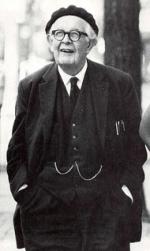Disable ads!
Jean Piaget
Jean Piaget Piaget at the University of Michigan, c. 1968 Born Jean William Fritz Piaget (1896-08-09)9 August 1896 Neuchâtel, Switzerland Died 16 September 1980(1980-09-16) (aged 84) Geneva, Switzerland Fields Developmental psychology, epistemology Known for Constructivism, genetic epistemology, theory of cognitive development, object permanence, egocentrism Influences Immanuel Kant, Henri Bergson, Pierre Janet, James Mark Baldwin Influenced Bärbel Inhelder, Jerome Bruner, Kenneth Kaye,[citation needed] Lawrence Kohlberg, Robert Kegan,[citation needed] Howard Gardner, Thomas Kuhn, Seymour Papert, Umberto Eco[citation needed], Lev Vygotsky Jean Piaget (French: [ʒɑ pjaʒɛ]; 9 August 1896 – 16 September 1980) was a Swiss developmental psychologist and philosopher known for his epistemological studies with children. His theory of cognitive development and epistemological view are together called "genetic epistemology". Piaget placed great importance on the education of children. As the Director of the International Bureau of Education, he declared in 1934 that "only education is capable of saving our societies from possible collapse, whether violent, or gradual." Piaget created the International Center for Genetic Epistemology in Geneva in 1955 while on the faculty of the University of Geneva and directed the Center until his death in 1980. The number of collaborations that its founding made possible, and their impact, ultimately led to the Center being referred to in the scholarly literature as "Piaget's factory." According to Ernst von Glasersfeld, Jean Piaget was "the great pioneer of the constructivist theory of knowing." However, his ideas did not become widely popularized until the 1960s. This then led to the emergence of the study of development as a major sub-discipline in psychology.
 Read more on wikipedia.org Read more on wikipedia.org
 All quotes by Jean Piaget All quotes by Jean Piaget
 Edit Edit
|

|
|
|
|
|
Background photo by Giuliana
|